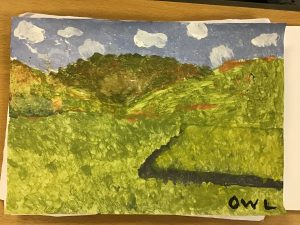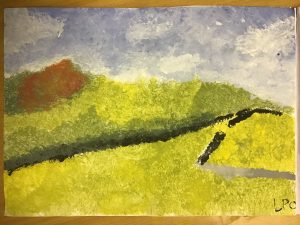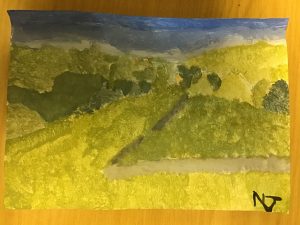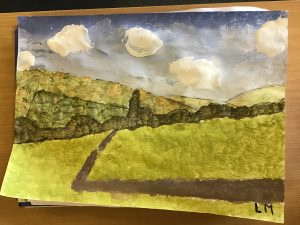Curriculum Exemplar
Landscape Art October 2020
Over the last two days the Year 5/6 classes have walked to Minchinhampton Common and Bubblewell to draw and paint in the open air or to use the correct expression, to engage in ‘plein air’ painting. Many landscape artists would claim this enables the artist to better capture the changing details of weather and light and lends itself to artwork with strong tonal qualities and colour, loose brushwork, and a softness of form. The Impressionists were exponents of plein air painting. Our children studied the Impressionist, Cezanne. Joseph said, ‘We have learnt about tints and shades and dabbing.’ Lucy said, ‘I like this style of art. I thought it would be fun to paint a big landscape. Doing it in the open air was hard because the landscape was so big and it was hard to choose what to focus on. We used viewfinders to help us do this. Also straight away we had created a shade or a tint with our colour mixing, the light would change and it would look different.’ Joseph said, ‘It was definitely different because I‘d never done that before and it was hard because we were on the top of a hill and it was windy and cold. However it was eye-opening to go outside and actually see what you were painting.’


We want our pupils to take from their primary education a delight in learning and to see possibilities everywhere; to be well set up for life. We see disciplinary knowledge as a way of revealing to them different ways of learning and hence opening up the world to them. For example we want them to know what it is to be a scientist and to feel enthusiastic at the prospect of science or know what it is to be an artist and to feel like an artist.


We look to develop understanding in individual subject disciplines. We focus on critical concepts in these different subject disciplines. These are concepts that have been identified as transformational, in that once they are mastered they have the capacity to transform a pupil’s understanding and appreciation of a subject discipline.
The best lessons, like this one, will have an epistemic quality, where learners engage explicitly with ways of knowing or critical concepts in that subject.
